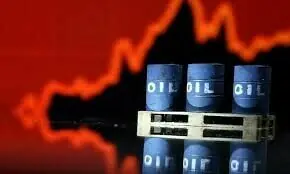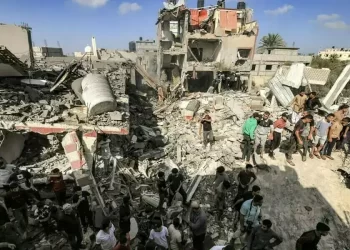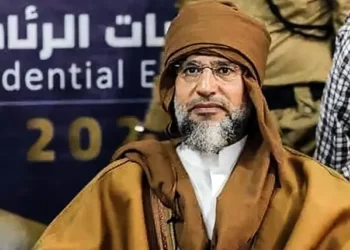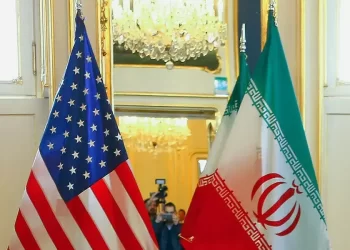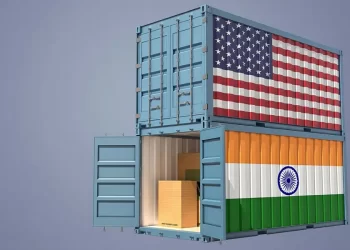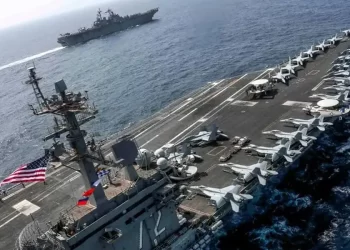WASHINGTON (news agencies) — President Joe Biden reaffirmed his commitment to Ukraine’s defense on Thursday, announcing a new military aid package on the final day of a NATO summit shadowed by concerns about growing Chinese and North Korean support for Russia’s invasion but also angst among Democrats about the American leader’s ability to serve another four years.
“We will stay with you, period,” Biden told Ukrainian President Volodymyr Zelenskky in a meeting.
Biden touted the package as his eighth since taking office, with this latest one consisting of $225 million of support, including an additional Patriot missile system to bolster Ukraine’s air defenses against a deadly onslaught of Russian airstrikes.
The Patriot air defense system, the second the U.S. has provided to Ukraine, is one of several Biden announced this week at the NATO summit and is part of a swell of pledges to get weapons to Ukraine to help it fend off Russian attacks, including one this week that hit a children’s hospital in Kyiv.
Zelenskyy thanked Biden for inviting him to the summit and called the new security package “strong news.”
But in his brief remarks to reporters at the start of the meeting, the Ukrainian leader also signaled that he intended to press Biden on further lifting U.S. restrictions on the use of American weaponry.
”We need some quick steps … to lift all limitations for our Ukrainian soldiers,” Zelenskyy said.
Later in the evening, all eyes will be on Biden as he closes out the summit of 32 NATO leaders in Washington with a news conference. It will provide a fresh chance for him to prove to the American public that he’s capable of serving another four years after his shocking debate flop threw the future of his presidency into doubt.
The flurry of final events at the NATO summit come a day after NATO labeled China a “decisive enabler” of Russia’s war against Ukraine. China in turn accused NATO of seeking security at the expense of others and it has warned the military alliance not to bring the same “chaos” to Asia.
“We appreciate the close partnership with your country, and not least because our security is not regional, it is global,” NATO Secretary-General Jens Stoltenberg said as he welcomed South Korean President Yoon Suk Yeol for the last day of the alliance’s summit in Washington.
“This is clearly illustrated by the war in Ukraine,” Stoltenberg added.
Stoltenberg convened NATO leaders in the military alliance’s main decision-making body, saying they would tackle “shared security challenges, including Russia’s war against Ukraine, China’s support for Russia’s war economy and the growing alignment of authoritarian powers.” He said allies must work ever closer to preserve peace.
European Union foreign policy chief Josep Borrell, who is also taking part in the talks, said it was important to draw all partners into a conversation on how to ensure stability, notably as China strengthens its ties with Russia, but also in the Asia-Pacific region.
“China is supporting a Russia in the name of this unlimited friendship. (North) Korea is one of the most important suppliers of raw material to Russia,” he told reporters. He noted that maritime border tensions “in the Indo-Pacific puts a threat to the stability of the whole region.”
Australia, New Zealand, Japan and South Korea are notably taking part in the summit.
Zelenskyy will join allied leaders later for a meeting of the NATO-Ukraine Council, a forum set up a year ago for the 32 allies and Kyiv to meet on an equal footing to share concerns and information.
On Wednesday, NATO leaders promised Ukraine that it is on an “irreversible path” to membership, although it can only join sometime after the war, when the allies agree that it has met all the conditions.
A missile attack on Ukraine’s biggest children’s hospital on the eve of the summit in Washington, to mark NATO’s 75th anniversary, underscored that Russian President Vladimir Putin may not be ready to make peace for some time.
Many allies also offered more military support, and NATO launched a new program to underwrite deliveries of military equipment and coordinate training for Ukraine’s beleaguered armed forces. NATO members also committed to keep up current levels of military aid — about 40 billion euros ($43.5 billion) annually — for at least a year.
news agencies reporters Aamer Madhani and Eric Tucker contributed.


